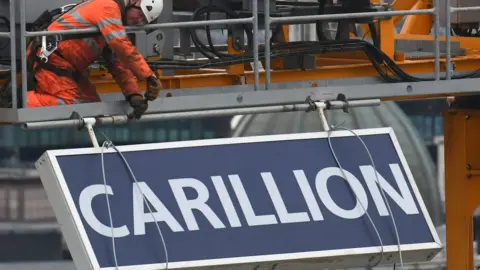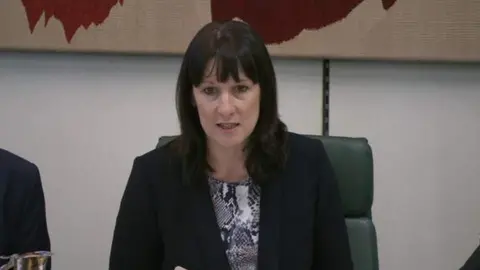Carillion collapse sparks break up call for 'Big four'
 Getty Images
Getty ImagesThe UK's biggest accountancy firms are facing renewed scrutiny in the wake of the collapse of Carillion.
Frank Field, the chair of the Work and Pensions Committee, asked whether KPMG, PwC, Deloitte and EY should be broken up in the wake of the firm's collapse.
Accountancy watchdog head Stephen Haddrill, agreed that the UK's four largest firms needed more competition.
He said there had been no recent entries from smaller companies to the top of the accounting industry market.
KPMG had handled Carillion's accounts since 1999 and signed off its figures last March, four months before the firm issued its first profit warning.
The issue was raised at a joint hearing of the Work and Pensions Committee and the Business Committee into Carillion's demise.
Mr Haddrill, chief of the Financial Reporting Council (FRC), said the Competition and Markets Authority would need to examine the situation again.
In 2013 its predecessor, the Competition Commission, heavily criticised the big four for having too close a relationship with company bosses. That resulted in a "tendency for auditors to focus on satisfying management rather than shareholders' needs," it found.
The FRC began closely monitoring Carillion in July 2017 following a profit warning, Mr Haddrill told MPs.
He said that was not public knowledge because of confidentiality requirements the council must observe, but added that those rules "need to be reviewed".
The FRC's enforcement powers also need examining, Mr Haddrill told the committee members. It can only act if misconduct occurs, but he said that the bar for proving that was "very high".
There was "enormous" cause for concern about how Carillion had been governed, he said: "We all look at what has happened with a degree of incredulity. We need to look on what basis directors were making decisions."
The accountancy watchdog said on Monday it would open an investigation into KPMG's audit of Carillion's accounts between 2014 and 2016, as well as the work it carried out last year.
Last week shadow chancellor John McDonnell called on the big four to change "their entire ethos" and stop helping clients to minimise their tax burden.
 HoC
HoCIn response to a question from Rachel Reeves, chair of the Business Committee, about Carillion's biggest asset being "goodwill" valued at £1.57bn, Mr Haddrill said that was "not untypical".
However, he added that the issue of accounting for such intangible assets was "something we're all struggling with" and would be a "good point for the investigation" into Carillion.
Sarah Albon, chief executive of the Insolvency Service, said Carillion was made up of 326 companies, including 199 in the UK, with a total of 169 directors across the group.
She told MPs there had been very poor record keeping by Carillion and determining the number of directors, which should have been readily available, had proved difficult.
